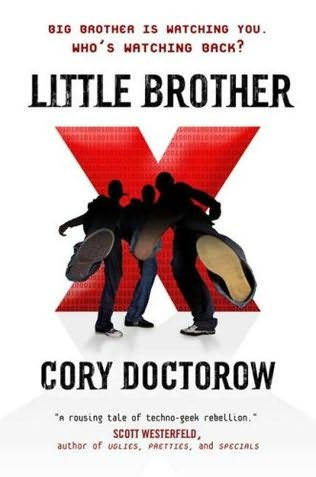Posted by Cobalt | Posted in review, technothriller, YA | Posted on 8:45 PM

Rating: 4/5 stars
Marcus Yallow, aka w1n5t0n, lives in a world basically like ours. He goes to high school in San Fransisco's Mission district, at an institution with a broken PA system, a petty dictator of a vice-president...and gait-monitor cameras in the hallways, tracking each student as they walk to and from class. Everyone's got those free classroom laptops -- that are all equipped with spyware, automatically logging each keystroke and reporting it to the school administration. Marcus Yallow does not live in a trusting world. But it's an eerily familiar one, otherwise.
Despite the ubiquitous surveillance, Marcus has a pretty good life -- he's figured out how to circumvent the system and enjoys tweaking Big Brother's nose every once in a while. He skips class pretty regularly, too, in order to join his teammates on Harajuku Fun Madness missions. Harajuku Fun Madness is an ARG, or alternate reality game, where players run around in the real world following clues that can be anything from GPS coordinates to a picture of a popular anime character. The game is fun in itself, but of course Marcus wants to win. Which is why he and his friends cut class to track down the next clue, and are out on the streets when the terrorists attack. And suddenly, the Department of Homeland Security seems to think that Marcus is one of the bad guys...
A smart teen techno-thriller that is accessible to non-geeks, Little Brother creates a world that looks a lot like ours, and asks uncomfortable questions about privacy and freedom that are deeply relevant today. Marcus is a sympathetic protagonist, and while his ideas about government and human rights remain firmly in the black-and-white, he is confronted with some interesting shades of gray as he becomes a fugitive in his own country. A good book for provoking discussion about pretty heavy political issues; even if the villains are Evil Freedom-Hating Government Agents and Narrow-Minded School Administrators, there are some 'good' characters who are convincingly on the fence, as everyday citizens torn between a need for security and nagging doubts about where the lines of government control should end. Where they actually do end is another question, since this book also offers disturbing insights on just how much we're being monitored, studied, and managed as a population (for our own safety, of course). It focuses on the darker side of 'conveniently' automated transactions, since that nifty travelpass swipe card can easily be used to track your daily commute -- and send up a flag when your travel behavior deviates from the norm.
Satisfyingly fast-paced, this is not a good book for the paranoid, but an excellent one for a current-day adventure, with a little techno-whiz education mixed in.

Comments (0)
Post a Comment